五年级英语下册重点句型复习
五年级英语下重点句型 Unit 1

雷山县郎德小学五年级英语下重点句型第一单元Unit One My day1.--- When do you get up? 你什么时候起床?--- I often get up at 7 o’clock. 我七点钟起床。
2.--- When do you go to bed? 你什么时候上床睡觉?--- I usually go to bed at 10 o’clock. 我通常十点钟上床睡觉。
3.--- When do you start class in Spain? 在西班牙你什么时候开始上课?--- I always start class at 8 o’clock. 我总是八点钟开始上课。
4.--- When do you finish class in the morning? 早上你们几点钟放学?--- We finish class at 1 o’clock. Then we eat lunch at home.我们一点钟放学,然后我们回家吃午饭。
5.--- When do you go back to school after lunch?午饭后你什么时候回学校?--- At 2:30. Classes start at 3 o’clock.两点三十分,三点开始上课。
6.--- When do you usually eat dinner in Spain?在西班牙你通常什么时候吃晚饭呢?--- We usually eat dinner at 9:30 or 10 o’clock. 我们通常九点半或十点吃晚饭。
7. --- When do you do morning exercises? 你们什么时候做早操?--- At 6:30 in the morning.早上六点半。
8. --- What do you do on the weekend? 你周末做什么?--- I often watch TV and play ping-pong with my father.我经常和我爸爸一起看电视或打乒乓球。
小学五年级英语下册《Unit 3》重点必背句型分类归纳
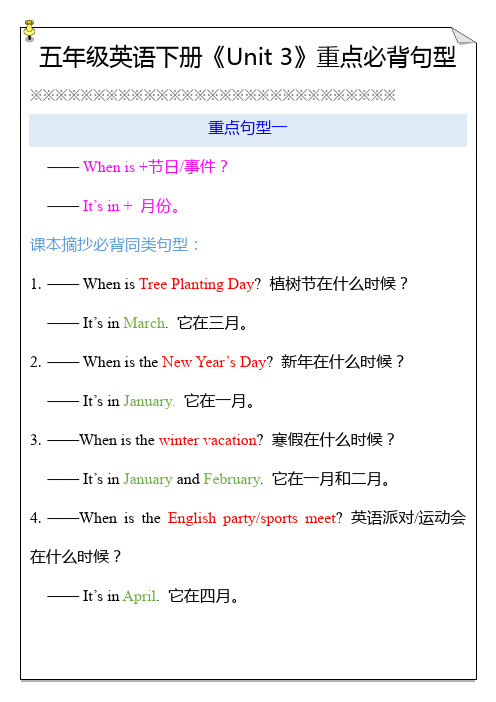
—— It’s inJune.它在六月。
8.——When is thesummer vacation?暑假在什么时候?
——It’s inJulyandAugust.它在七月和八月。
9.——When isTeacher语下册《Unit 3》重点必背句型
※※※※※※※※※※※※※※※※※※※※※※※※※※※※※
重点句型一
——When is +节日/事件?
——It’s in +月份。
课本摘抄必背同类句型:
1.—— When isTree Planting Day?植树节在什么时候?
—— It’s inMarch.它在三月。
2.—— When is theNew Year’s Day?新年在什么时候?
—— It’s inJanuary.它在一月。
3.——When is thewinter vacation?寒假在什么时候?
—— It’s inJanuaryandFebruary.它在一月和二月。
4.——When is theEnglish party/sports meet?英语派对/运动会在什么时候?
—— It’s inApril.它在四月。
5.—— When is thesinging contest/school trip?歌唱比赛/学校旅行在什么时候?
—— It’s inMay.它在五月。
6.—— When isMay Day/Mother’s Day?五一劳动节/母亲节在什么时候?
—— It’s inMay.它在五月。
—— It’s inSeptember.
人教版五年级英语下册重点句型及语法

人教版五年级英语下册重点句型及语法第一单元1、其他日常活动:eat breakfast 吃早饭 eat lunch吃午饭 eat dinner 吃晚饭get up起床 go to bed 上床睡觉 wash my clothes 洗我的衣服watch TV看电视 go swimming 去游泳 go running去跑步do homework 做作业 do kungfu练武术 play ping-pong打乒乓球play football踢足球 play basketball打篮球 play the pipa弹琵琶play music 演奏音乐 finish class 结束上课 start class 开始上课in the water/sea 在水里/在海里 is good at 擅长 get off 逃脱 lots of 许多2、频度副词。
always总是,一直(100%)usually通常(80%) often 经常(60%)sometimes(30%)有时3、疑问词。
when什么时候 why 为什么 what 什么重点句型。
1、询问别人什么时候做某事的句型及回答。
句型结构:问:When do you+动词短语原形+其他?(你/你们什么时候做某事?)答:I/we(+频度副词)+动词短语原形+at+具体时间(我/我们通常在几点做某事。
)例:问:When do you go to bed?(你什么时候上床睡觉?)答:I go to bed at 9:00p.m (我晚上9点上床睡觉。
)注意:当主语是第三人称单数(he,she,it,单个人名或单数名词)时,助动词do要变成doe s,句型结构是:when does+主语(第三人称单数)+动词短语原形+其他?2、询问别人周末做什么的句型及回答。
句型结构:问:What do you do on the weekend?(你周末做什么?)答:I(+频度副词)+动词(短语)+其他。
五年级下册英语Unit4重点句子归纳
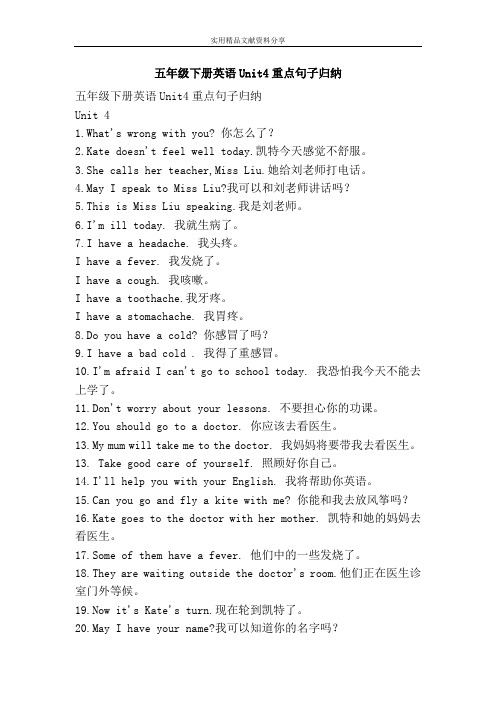
五年级下册英语Unit4重点句子归纳五年级下册英语Unit4重点句子归纳Unit 41.What's wrong with you? 你怎么了?2.Kate doesn't feel well today.凯特今天感觉不舒服。
3.She calls her teacher,Miss Liu.她给刘老师打电话。
4.May I speak to Miss Liu?我可以和刘老师讲话吗?5.This is Miss Liu speaking.我是刘老师。
6.I'm ill today. 我就生病了。
7.I have a headache. 我头疼。
I have a fever. 我发烧了。
I have a cough. 我咳嗽。
I have a toothache.我牙疼。
I have a stomachache. 我胃疼。
8.Do you have a cold? 你感冒了吗?9.I have a bad cold . 我得了重感冒。
10.I'm afraid I can't go to school today. 我恐怕我今天不能去上学了。
11.Don't worry about your lessons. 不要担心你的功课。
12.You should go to a doctor. 你应该去看医生。
13.My mum will take me to the doctor. 我妈妈将要带我去看医生。
13. Take good care of yourself. 照顾好你自己。
14.I'll help you with your English. 我将帮助你英语。
15.Can you go and fly a kite with me? 你能和我去放风筝吗?16.Kate goes to the doctor with her mother. 凯特和她的妈妈去看医生。
小学五年级下册英语重点句型(Unit2~Unit5)

【导语】英语的基础就是从单词起步到句⼦,所谓的句⼦练习,它包含了你对单词的认知,包含了你对语法知识点的认知,包含了你⼝语能⼒的认知,句⼦练习可以让你知道,⽤英语思维说话是什么样的。
以下是⽆忧考整理的《⼩学五年级下册英语重点句型(Unit 2~Unit 5)》相关资料,希望帮助到您。
⼩学五年级下册英语重点句型(Unit 2) Unit 2 重点句型: 1.What’s your favourite season? 你最喜爱的季节是什么? 2.What’s the weather like in spring?It’s sunny and warm. 春天的天⽓像什么样⼦?⼜晴朗⼜暖和。
3.Which season do you like best?Winter. I can make a snowman. 你最喜欢哪个季节?冬天,我可以堆雪⼈。
4.I can play with snow. 我可以玩雪。
5.Winter is beautiful, but it’s too cold for me. 冬天时美丽的,但是对我来说太冷了。
6.Why do you like winter?Because I can sleep a long time. 你为什么喜欢冬天?因为我可以睡懒觉。
7.When is the best time to go to Beijing? Fall. 去北京的时间是什么时候?秋天。
8. What is the weather like in fall in Beijing? It’s sunny and cool. 北京秋天的天⽓像什么样⼦?⼜晴朗⼜凉爽。
9.What can I do there?You can go to the Great Wall. 我可以在那⾥做什么?你可以去长城。
10.Spring is from March to May. 春天从三⽉到五⽉。
完整版)外研版五年级英语下册重点句型和短语
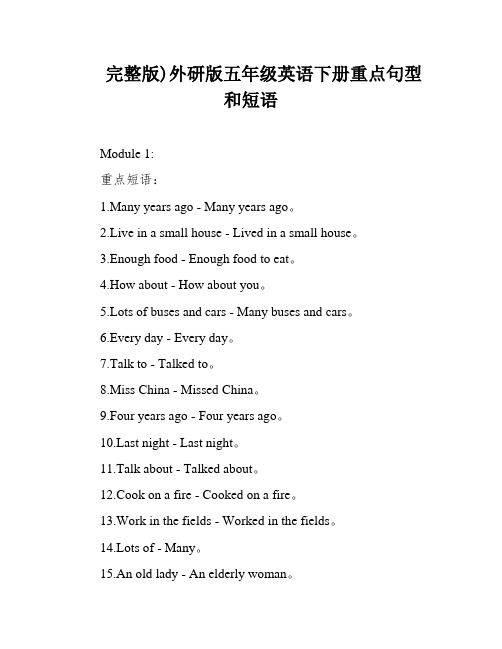
完整版)外研版五年级英语下册重点句型和短语Module 1:重点短语:1.Many years ago - Many years ago。
2.Live in a small house - Lived in a small house。
3.Enough food - Enough food to eat。
4.How about - How about you。
5.Lots of buses and cars - Many buses and cars。
6.Every day - Every day。
7.Talk to - Talked to。
8.Miss China - Missed China。
9.Four years ago - Four years ago。
st night - Last night。
11.Talk about - Talked about。
12.Cook on a fire - Cooked on a fire。
13.Work in the fields - Worked in the fields。
14.Lots of - Many。
15.An old lady - An elderly woman。
16.A programme about China - A program about China.重点句型:1.There was(were)+某人或某物+某地 - There was(were)+ XXX(即there be句型的过去式)如:There XXX’t any buses。
There were no buses。
(any意为“一些”用于否定句)2.XXX food。
- We didn't have enough food to eat.这里的didn’t为助动词,后接动词原形)3.Thank you for talking to us。
- Thank you for talking with us.for是介词,后接动词的ing形式。
译林小学英语五年级(下册)(全册)重点
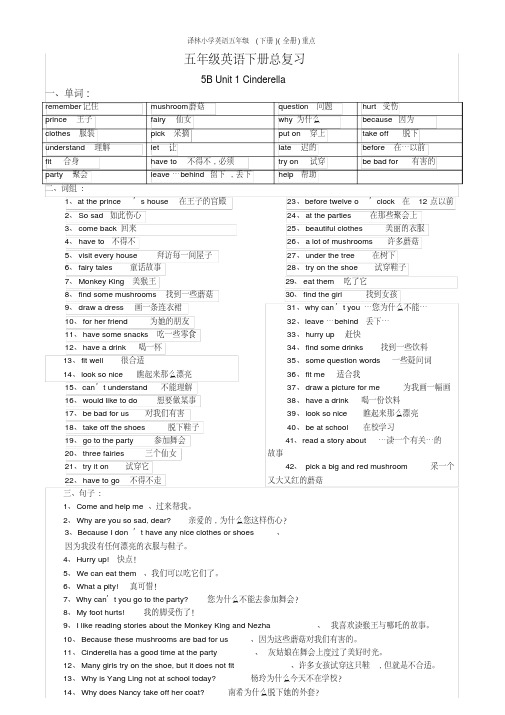
五年级英语下册总复习5B Unit 1 Cinderella一、单词:remember记住mushroom蘑菇question问题hurt受伤prince 王子fairy仙女why 为什么because 因为clothes服装pick 采摘put on 穿上take off 脱下understand 理解let 让late 迟的before 在…以前fit 合身have to 不得不,必须try on 试穿be bad for 有害的party 聚会leave…behind 留下,丢下help 帮助二、词组:1、at the prince’s house在王子的宫殿2、So sad 如此伤心3、come back回来4、have to不得不5、visit every house拜访每一间屋子6、fairy tales童话故事7、Monkey King 美猴王8、find some mushrooms找到一些蘑菇9、draw a dress画一条连衣裙10、for her friend 为她的朋友11、have some snacks吃一些零食12、have a drink喝一杯13、fit well 很合适14、look so nice瞧起来那么漂亮15、can’t understand不能理解16、would like to do想要做某事17、be bad for us 对我们有害18、take off the shoes 脱下鞋子19、go to the party 参加舞会20、three fairies 三个仙女21、try it on试穿它22、have to go不得不走23、before twelve o’clock 在12点以前24、at the parties在那些聚会上25、beautiful clothes 美丽的衣服26、a lot of mushrooms许多蘑菇27、under the tree 在树下28、try on the shoe试穿鞋子29、eat them 吃了它30、find the girl 找到女孩31、why can’t you…您为什么不能…32、leave…behind丢下…33、hurry up 赶快34、find some drinks 找到一些饮料35、some question words一些疑问词36、fit me 适合我37、draw a picture for me 为我画一幅画38、have a drink喝一份饮料39、look so nice 瞧起来那么漂亮40、be at school 在校学习41、read a story about…读一个有关…的故事42、 pick a big and red mushroom采一个又大又红的蘑菇三、句子:1、Come and help me、过来帮我。
PEP五年级英语下册重点句型
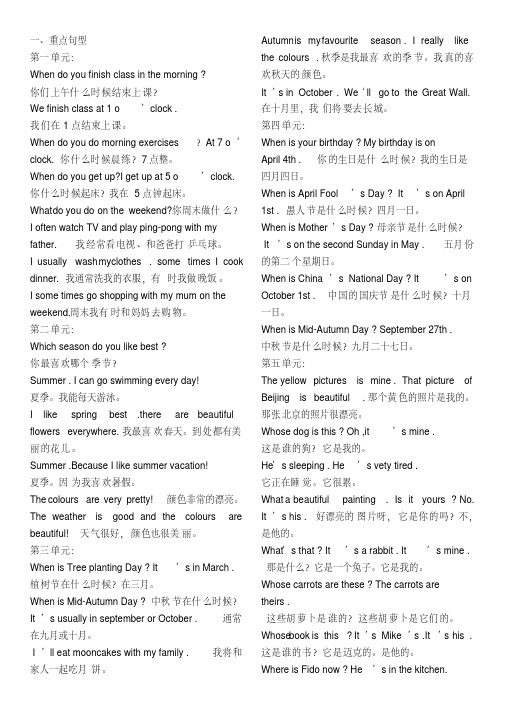
一、重点句型第一单元:When do you finish class in the morning ?你们上午什么时候结束上课?We finish class at 1 o’clock .我们在1点结束上课。
When do you do morning exercises ?At 7 o’clock.你什么时候晨练?7点整。
When do you get up?I get up at 5 o’clock. 你什么时候起床?我在5点钟起床。
What d o you do on the weekend ?你周末做什么?I often watch TV and play ping-pong with my father. 我经常看电视、和爸爸打乒乓球。
I usually wash my c lothes . some times I cook dinner.我通常洗我的衣服,有时我做晚饭。
I some times go shopping with my mum on the weekend.周末我有时和妈妈去购物。
第二单元:Which season do you like best ?你最喜欢哪个季节?Summer . I can go swimming every day!夏季。
我能每天游泳。
I like spring best .there are beautiful flowers everywhere.我最喜欢春天。
到处都有美丽的花儿。
Summer .Because I like summer vacation!夏季。
因为我喜欢暑假。
The colours are very pretty! 颜色非常的漂亮。
The weather is good and the colours are beautiful!天气很好,颜色也很美丽。
第三单元:When is Tree planting Day ? It’s in March . 植树节在什么时候?在三月。
人教版小学五年级英语下册重点知识归类
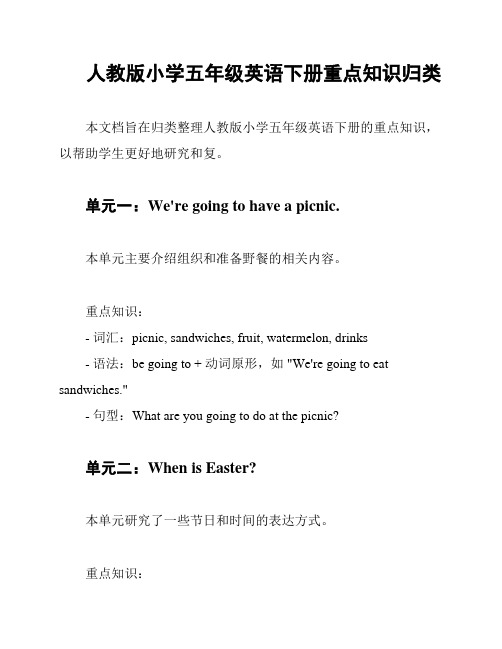
人教版小学五年级英语下册重点知识归类本文档旨在归类整理人教版小学五年级英语下册的重点知识,以帮助学生更好地研究和复。
单元一:We're going to have a picnic.本单元主要介绍组织和准备野餐的相关内容。
重点知识:- 词汇:picnic, sandwiches, fruit, watermelon, drinks- 语法:be going to + 动词原形,如 "We're going to eat sandwiches."- 句型:What are you going to do at the picnic?单元二:When is Easter?本单元研究了一些节日和时间的表达方式。
重点知识:- 词汇:Easter, Christmas, New Year's Day, Halloween- 语法:疑问词when和具体时间的表达,如 "When is Easter?"- 句型:When is Christmas?单元三:Do you want to go to a movie?本单元研究了表达意愿和邀请的相关内容。
重点知识:- 词汇:movie, park, zoo, museum, swimming pool- 语法:do you want to + 动词原形,如 "Do you want to go to a movie?"- 句型:Do you want to go to the park?单元四:Can you swim?本单元介绍了一些体育运动和能力的表达方式。
重点知识:- 词汇:swim, run, jump, skate, ride- 语法:can + 动词原形,如 "Can you swim?"- 句型:Can you ride a bike?单元五:What's the matter with you?本单元主要研究了描述身体状况和感受的表达方式。
五年级英语下册重点句型汇总(人教版)
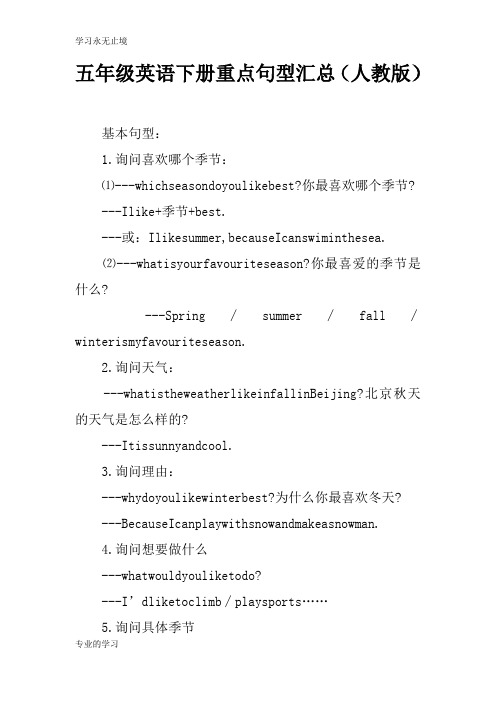
五年级英语下册重点句型汇总(人教版)基本句型:1.询问喜欢哪个季节:⑴---whichseasondoyoulikebest?你最喜欢哪个季节?---Ilike+季节+best.---或:Ilikesummer,becauseIcanswiminthesea.⑵---whatisyourfavouriteseason?你最喜爱的季节是什么?---Spring∕summer∕fall∕winterismyfavouriteseason.2.询问天气:---whatistheweatherlikeinfallinBeijing?北京秋天的天气是怎么样的?---Itissunnyandcool.3.询问理由:---whydoyoulikewinterbest?为什么你最喜欢冬天?---BecauseIcanplaywithsnowandmakeasnowman.4.询问想要做什么---whatwouldyouliketodo?---I’dliketoclimb∕playsports……5.询问具体季节---whatseasonisitinmarchinBeijing?北京的三月份是什么季节?---Itisspring.6.询问能做什么---whatcanIdothere?我在那里能做什么?---youcangototheGreatwall.你可以去长城。
7.询问接下来打算去哪里?---whereareyougoingonvacation?假期你打算去哪里?---Iamgoingtocanada.我将要去加拿大。
8.SummerisfromjunetoAugust.六月至八月是夏天。
9.HowdoIlook?我看起来怎么样?10.Sendmeapostcard.寄明信片给我。
11.HowdidTHAThappen?那是怎么发生的!12.whenisthebesttimetogotoBeijing?Fall.什么时候最适合去北京?秋天。
pep人教版五年级下册重点词汇和句型专项复习练习题答案
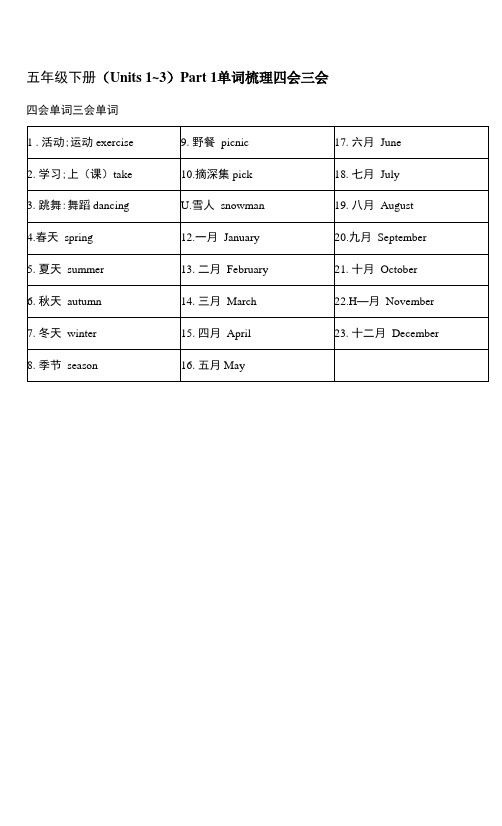
五年级下册(Units 1~3)Part 1单词梳理四会三会四会单词三会单词你们上午的课到几点结束?-我们11点结束课。
- When do you finish class in the morning? -At 11 o,clock.在西班牙你通常什么时候吃晚饭?-通常在九点半或十点钟。
-When do you usually eat dinner in Spain?-Usually at 9:30 or 10 o'clock.你什么时候做早操?--七点钟。
-When do you do morning exercises ?-At seven o'clock.你周末做什么?-我经常去购物。
-What do you do on the weekend?-I often go shopping .5.你需要一个机器人来帮助你!You need a robot lo help you!6.我经常星期六打扫我的房间。
I often clean my roomon Saturdays.7.我周末有时和爸妈散步。
I sometimes go for a walk with my parents on theweekend. 迈克,你最喜欢哪个季节?--冬天。
我喜欢雪。
- Which season do you like best, Mike?-Winter I like snow.9.我能每天去游泳!I can goswimming every day!10.我最喜欢春天。
因为有美丽的花。
I like spring best. Because there are pretty flowers .11.我经常和我的家人去野餐。
I often go on a picnic with my family.12.我们经常在冬天堆雪人。
We often make a snowman in winter.13-唱歌比赛在什么时候?--通常在五月。
最新苏少版五年级英语下册重点句型汇总(全册)
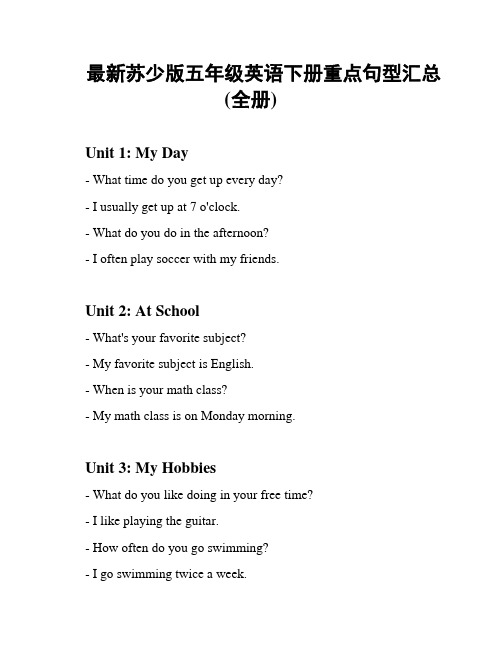
最新苏少版五年级英语下册重点句型汇总(全册)Unit 1: My Day- What time do you get up every day?- I usually get up at 7 o'clock.- What do you do in the afternoon?- I often play soccer with my friends.Unit 2: At School- What's your favorite subject?- My favorite subject is English.- When is your math class?- My math class is on Monday morning.Unit 3: My Hobbies- What do you like doing in your free time?- I like playing the guitar.- How often do you go swimming?- I go swimming twice a week.Unit 4: My Family- Do you have any brothers or sisters?- Yes, I have one brother and one sister. - What does your father do?- My father is a doctor.Unit 5: Food and Drinks- What's your favorite fruit?- My favorite fruit is watermelon.- Do you like milk?- Yes, I like milk very much.Unit 6: My Town- Is your town big or small?- My town is small.- What's your favorite place in your town? - My favorite place is the park.Unit 7: Weather and Seasons- What's the weather like in winter?- It's cold in winter.- Which season do you like the most? - I like spring the most.Unit 8: Clothes- What do you usually wear in summer? - I usually wear shorts and a T-shirt.- Do you like wearing hats?- No, I don't like wearing hats.Unit 9: In the Zoo- What animals can you see in the zoo? - You can see lions, tigers, and giraffes. - Can you feed the animals in the zoo? - No, we can't feed the animals.Unit 10: My Body- How many fingers do you have?- I have ten fingers.- Can you touch your nose with your tongue?- No, I can't touch my nose with my tongue.Unit 11: Sports Day- Do you like Sports Day?- Yes, I like Sports Day.- What sports can you play?- I can play soccer, basketball, and badminton.Unit 12: Holidays- When is Children's Day?- Children's Day is on June 1st.- Where do you usually go on vacation?- I usually go to the beach on vacation.以上是最新苏少版五年级英语下册的重点句型汇总,包括了每个单元的常用句型和问题。
外研版五年级英语下M1-M5重点句型和短语

外研版五年级英语下M1-M5重点句型和短语外研版三起五年级英语下M1重点句型和短语一、短语:1.live in住在....2.still in England仍然在英国3.a programme about China一个关于中国的节目4.I`m coming!我就来!5.old lady老女士6.in China在中国7.many years ago许多年以前8.in a small house在一个小房子里9.enough food 足够的食物10.How about....?....怎么样?11.lots of许多12.every day 每天13.watch TV看电视14.Thank you for.....为...而感谢你15.talk to....和.....谈话16.miss China想念中国17.four years ago四年以前18.a television programme about China一个关于中国的电视节目/doc/4015797906.html,st year去年20.talk about her life谈论她的生活21.on a fire在火上22.work in the fields在田里干活二、句型:1.I`m coming!我就来!【这是一个现在进行时态的句子,在这里表示将来的动作。
2.Life was very different in China many years ago.在中国,许多年以前的生活非常不同。
【本句由于有many years ago这个过去的时间,说明事情是发生在过去,所以谓语动词be要用一般过去时态was。
一般过去时态是表示过去经常发生的动作和存在的状态。
谓语动词要用其过去式。
动词过去式的变化规则:1.一般在动词原形后加-ed。
如look-looked;2以不发音的e结尾的只加-d如:live-lived;3.末尾只有一个辅音字母的重读闭音节词,先双写这个辅音字母,再加-ed.如:stop-stopped;4.末尾是辅音字母加y的动词,现变y为i,再加-ed.如:study-studied.5,不规则的动词过去式需特殊记忆:am/is--was;are--were; go--went; come-- came; take--took;have/has--had】再如We lived in a small house many years ago.许多年以前我们住在小房子里。
五年级下册英语第四单元复习
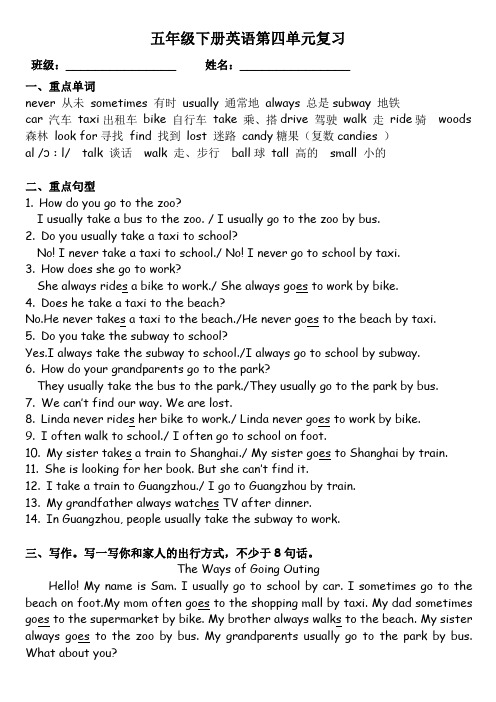
五年级下册英语第四单元复习班级:_______________姓名:_______________一、重点单词never从未sometimes有时usually通常地always总是subway地铁car汽车taxi出租车bike自行车take乘、搭drive驾驶walk走ride骑woods 森林look for寻找find找到lost迷路candy糖果(复数candies)al/ɔːl/talk谈话walk走、步行ball球tall高的small小的二、重点句型1.How do you go to the zoo?I usually take a bus to the zoo./I usually go to the zoo by bus.2.Do you usually take a taxi to school?No!I never take a taxi to school./No!I never go to school by taxi.3.How does she go to work?She always rides a bike to work./She always goes to work by bike.4.Does he take a taxi to the beach?No.He never takes a taxi to the beach./He never goes to the beach by taxi.5.Do you take the subway to school?Yes.I always take the subway to school./I always go to school by subway.6.How do your grandparents go to the park?They usually take the bus to the park./They usually go to the park by bus.7.We can’t find our way.We are lost.8.Linda never rides her bike to work./Linda never goes to work by bike.9.I often walk to school./I often go to school on foot.10.My sister takes a train to Shanghai./My sister goes to Shanghai by train.11.She is looking for her book.But she can’t find it.12.I take a train to Guangzhou./I go to Guangzhou by train.13.My grandfather always watches TV after dinner.14.In Guangzhou,people usually take the subway to work.三、写作。
五年级下册英语知识点整理
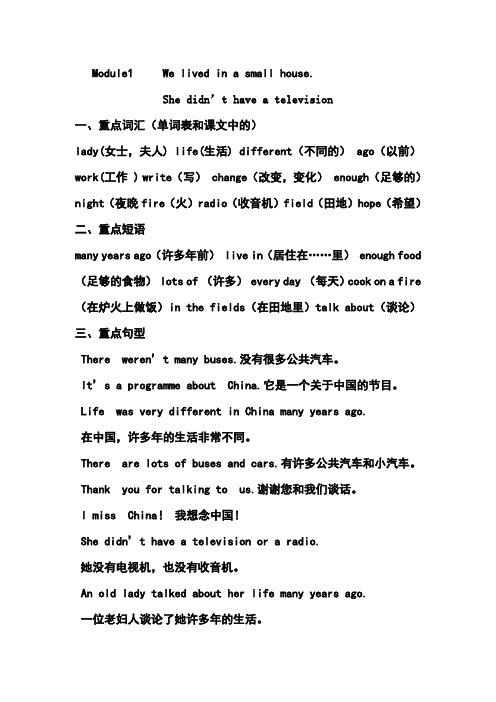
Module1 We lived in a small house.She didn’t have a television一、重点词汇(单词表和课文中的)lady(女士,夫人) life(生活) different(不同的) ago(以前)work(工作 ) write(写) change(改变,变化) enough(足够的)night(夜晚fire(火)radio(收音机)field(田地)hope(希望)二、重点短语many years ago(许多年前) live in(居住在……里) enough food (足够的食物) lots of (许多) every day (每天)cook on a fire (在炉火上做饭)in the fields(在田地里)talk about(谈论)三、重点句型There weren’t many buses.没有很多公共汽车。
It’s a programme about China.它是一个关于中国的节目。
Life was very different in China many years ago.在中国,许多年的生活非常不同。
There are lots of buses and cars.有许多公共汽车和小汽车。
Thank you for talking to us.谢谢您和我们谈话。
I miss China!我想念中国!She didn’t have a television or a radio.她没有电视机,也没有收音机。
An old lady talked about her life many years ago.一位老妇人谈论了她许多年的生活。
She couldn’t read or write. 她不会读也不会写。
四、自然拼读ai,ay /ei/ rain play al,au /ɔ: / walk autumn ar/ɑ:/ farmer party ar/ɔ:/ warm quarter五、背诵重点:课文第二部分六、语法点:过去式Module 2 She learnt English.Mr Li was a teacher.一、重点词汇learnt 学习(learn的过去式) foreign(外国的) studied 学习(study的过去式) language(语言) taught 教,讲授(teach 的过去式) wrote 写(write的过去式) dancer(舞蹈演员) hard (努力地)二、重点短语Foreign language(外语) learn English(学习英语) make a cake(做蛋糕)twenty years ago(二十年前)in his class(在他班里) a good pupil(一个好学生) an English teacher(一位英语老师) walk to school(步行去上学) by school bus(乘坐校车)三、重点句子Did she learn any foreign language她学过外语吗But he’s learning English now.但是他现在正在学习英语。
外研社小学英语五年级下学期期末复习重点

期末复习重点第一模块一、重点单词:life生活 different不同的 ago以前 any任何,一些 television 电视机 field田地 us我们宾格grandchildren外孙子女 radio收音机 fire炉火 grandmother外祖母 lady女士,夫人telephone电话hope希望二、重点短语及知识点:in China在中国 many years ago许多年前enough food充足的食物 lots of许多 watch TV看电视have got 有,拥有every day每天four years ago四年前 a television programme一个电视节目last night昨晚 talk about讨论on athe fire在火上in the fields在地里 live过去式lived a smallbig house一栋小大房子come现在分词comingare过去式were were否定形式weren’tdid否定形式didn’t change现在分词chingingis过去式was bus复数buses三、重点句型:1. We lived in a small house.我们住在一间小房子里;2.It’s a programme about China.它是一个关于中国的节目;3. Life was very different in China many years ago.许多年前中国的生活完全不同;4. There are lots of buses and cars.有许多公交车和小汽车;5.We live in a big house.我们住在一间大房子里;6.Yesterday I watched TV with my grandchildren.昨天我和孙子们一起看电视了;7. Thank you for talking to us. 谢谢您和我们谈话;for后面的动词要加+ing形式8. She didn’t have a television .她那时候没有电视;9. I watched a televison programme about China last night.昨晚我看了一个关于中国的访谈节目;10. An old lady talked about her life many years ago.一个年老的女士谈论了她许多年前的生活;11.She couldn’t read or write. 她不能读也不能写;could或者couldn’t后面要加动词原形否定句里要用 or,不用and 12. A:How was it different 有什么不同B:There weren’t any buses.那时候没有公交车;情景连线否定句和疑问句中要使用any,不能使用some13.A:Where were you three days ago 三天前你在哪里B: I was in Qiu Jiagou.我在邱家沟;情景连线14.A:What did you do there 你在那里干什么疑问句中有一个did 表示过去式,所以后面的动词要用原形,例如本句中的 do B: I played with my friends.我和我的朋友玩;情景连线第二模块一、重点单词:learntlearn的过去式学习 these这些 dancer舞蹈演员class班级 study学习hard努力的 retired退休的二、重点短语及知识点:Chinese city中国城市 city复数citiesforeign languages外语 five years ago五年前by school bus乘校车walk to school步行去学校read a book读书make a cake做蛋糕dance过去式danced learn过去式learntlearn现在分词learning make过去式madeteach过去式taught study过去式studiedgo三单goes dance名词dancer三、重点句型:1.A: Why is she wearing these clothes 她为什么要穿这些衣服呢B: Because she was a dancer.因为她是个舞蹈演员;重点加情连2.She danced in lots of Chinese cities.她在中国许多城市跳过舞;3. A: Did your grandma learn English 你奶奶学过英语吗B: Yes,she did.\No,she didin’t.情景连线4. He is learning English now.他现在正在学习英语;now表示现在进行时,所以learn后面+ing5. Chen Hai is an English teacher.陈海是一位英语老师;English前面要用an6.Now he goes to school by school bus.他现在坐校车去上学;三单7. A:Who are they 他们是谁B:They’re my grandparents.他们是我的爷爷奶奶;情景连线8. A: Who’s this 这是谁B:It’s my grandma.这是我奶奶;情景连线9. A: Is this your grandpa 这是你爷爷吗B: Yes,it is.是的;情景连线10.A:What did she do yesterday 她昨天干什么了B: She made a cake.她做了个蛋糕;情景连线第三模块一、重点单词:egg鸡蛋 email电子邮件 sandwich三明治 traditional传统的 delicious 美味的,可口的 hamburger汉堡 ateeat的过去式吃 gavegive的过去式给 tonight在今夜,今晚drankdrink的过去式二、重点短语及知识点:an email一封邮件 English food英国食物 an English breakfast一顿英国早餐 at school在学校a traditional English dinner一顿传统的英国晚餐 Chinese food中国食物 last night昨晚have过去式had do过去式did sandwich复数 sandwiches do第三人称单数doessay三单says eat过去式ate does否定形式doesn’t give过去式gave buy过去式bought三、重点句型:1.A:What did she have for breakfast 她早餐吃的什么B:She had eggs and sausages.她吃的鸡蛋和香肠;情景连线 2.I have got an email from Lingling.我收到玲玲的邮件;3.Yesterday she had an English breakfast.昨天她吃了一顿英国早餐;4.A:Does Lingling like English food 玲玲喜欢英国食物吗B: Yes,she does.\No,she doesn’t.是的,她喜欢;\不,她不;情景连线 5. A:What did you have for breakfast yesterday 你昨天早晨吃的什么 B:I had eggs我吃的鸡蛋;情景连线6. Today Sam ate six hamburgers at school.今天山姆在学校吃了六个汉堡包;7.We gave our hamburgers to Sam.我们把我们的汉堡包给了山姆;8. Tonight Mum is going to cook Chinese food for Lingling.今晚妈妈打算给玲玲做中国食物;9. A:What did you eat\drink last night 昨晚你吃的\喝的什么 B: I ate\drank…我吃的\喝的…情景连线10.A:What are you going to eat\drink tonight 你今晚打算吃\喝什么 B:I’m going to eat\drink…我打算吃\喝…情景连线第四模块一、重点单词:library图书馆 find找到 CD-ROM电脑光盘 bring带来,拿来 newspaper报纸 use使用card卡片 easy简单的 information信息 timetable时间表,时刻表 dictionary字典二、重点短语及知识点:make an e-card做电子卡片 good at 擅长于 go to the library去图书馆on Shelf C在C书架上library card图书证 bring back带回来 in two week’s time两周内 find out 找出 Chinese word汉字 in the timetable在信息表里 in the dictionary在字典里 on the CD-ROM在光盘上at the zoo在动物园in the newspaper在报纸上 on the computer在电脑上 on TV在电视上 buy过去式bought三、重点句型:1.A:Where are the books about computers,please 请问电脑书在哪里 B:They are on Shelf C.在C书架上;情景连线2. I want to make an e-card for Mum.我想给妈妈做一张电子卡片; want后面加to,to后面则用动词原形make; e-card前要用an修饰,不用a. 3.Let’s go to the library.让我们去图书馆吧;let’s后面加动词原形4.We can find a book about e-cards there.在那里我们能找到关于电子卡片的书;5. A: Can I have your library card,please 我能看一下你的借书证吗 B: Yes.Here you are.是的,给你;情景连线6.Please bring back the book in two weeks’time.请两周内还书;7. Where can you find out about animals 你能从哪里找到关于动物的书8.You can find out about Chinese food/words on this CD-ROM/in the dict ionary. 你在这张光盘\字典里找到关于中国的食物\汉字;9. There is also a CD-ROM in it.里面有一张光盘;在…里面要用in 10. I’m not good at it.我不擅长;good at 固定短语,擅长于 11. Here is a card for you.这是给你的卡片;for “为了…;给… 12. It’s easy with a computer. 电脑很简单;with“用…”第五模块一、重点单词:light轻的 broken坏的,破的 heavy重的 pocket口袋,兜儿 hard困难的二、重点短语及知识点:look at看,看一看 thank you very much非常感谢 I will缩写形式 I’ll big反义词small heavy反义词light new反义词broken easy反义词hard can否定形式can’t she宾格her三、重点句型:1.This black bag is nice.这个黑色的包不错;2.You can’t take it to China.你不能把它带回中国;3.I’ll buy you a new one.我会给你买个新的;4.This blue one is big and light.这个蓝色的既大又轻;5.It’ll be easy for heryou.它会很合适她你;6. It’s got a panda on it.上面有个熊猫;7. A: Have you got a small one,please 你有小一点的吗B:Yes, I have.\No,I haven’t.是的,我有;\不,我没有;情景连线8.A: Is it round 它是圆的吗 B:Yes, it is.\No,it isn’t.是的,它是;\不,不是;情景连线第六模块一、重点单词:photo照片 stay停留 week星期,周 parent父亲,母亲 rode骑马 horse 马 climb攀登,爬 holiday假日二、重点短语及知识点:last year去年 in the west og在…西边 play football踢足球 in July在七月 every year每年ride a horse骑马 go swimming去游泳 go过去式went photo复数photos do过去式didstay过去式stayed live第三人称单数lives ride过去式rode is过去式was have过去式had east东 west西south南north北三、重点句型:1. It’sXinjiang in the west of China.它新疆在中国的西部;2. We stayed with my grandmother for a week in July.七月我们和奶奶呆了一个星期;3. He lives there with his tree children.他和他的三个孩子住在那里;4. A: When did you go to Xinjiang 你们什么时候去的新疆 B: We went there in July.我们七月去的;情景连线5. A:Did you go with your mother and father 你和你爸妈一起去的吗 B:Yes,I did.\No,I didn’t.是,是的;\不,没有;情景连线 6. A:Where did you go for your holiday 你假期去哪里了 B:I went to Yinchuan.我去了银川;情景连线7.A: Can I see them,Lingling 我能看看他们吗,玲玲B: Of course.当然;情景连线 8.A:Who is this 这是谁B: It’s my uncle.是我的叔叔;情景连线9.The mountains are really beautiful.这些山实在是太漂亮了;mountain后加s,所以用are第七模块一、重点单词:message信息 another另一个 idea主意,想法 office办公室 busy忙碌的二、重点短语及知识点:send an email发送电子邮件 a computer message一条电脑信息 a good idea一个好主意 click on 点击 write your message写你的信息 at the office在办公室on the blackboard在黑板上see you later一会见,回头见写电子邮件的顺序:Click on“Email”点击邮件------- Click on“Write”点击书写---- Write your message.书写电子邮件--- Click on“Send”点击发送三、重点句型:1. It goes from one computer to another computer.它从一台电脑到另一台电脑;2. Let’s send an email to Dad.让我们给爸爸发送邮件吧3. The message will go to Dad’s computer at work.这条信息会在爸爸的电脑工作室发过去;4. I’ve got an email from little Tom.我收到了小汤姆的邮件;5. I will be home at seven o’clock.我七点回家;6. I am working very hard at the office.我在办公室努力的工作;第八模块一、重点单词:suggest 建议 quickly快地,迅速地 excited激动的,兴奋的 America美国 Chinese中国人kind种类 dragon 龙 same相同的 circle圆,圆圈二、重点短语及知识点:come quickly快点来 in the summer在夏天 a good idea一个好主意 a Chinese in the sea在大海里dragon kite一个中国龙风筝….the same as…和….一样三、形容词的比较级:一般形容词的比较级是在这个单词的后面加-erlong---longer short---shorter big---bigger small—smaller thin---thinner fat---fatter young---younger old---older tall--taller四、重点句型:1. What do you suggest 你有什么建议2. Daming is on the phone for you.大明电话找你;3. I’m going to go to America in the summer.今夏天我要去美国了;4. I want to take a present for my cousinbrother.我想给我堂兄兄弟带件礼物;5. Why don’t you give him a kite 你为什么不给他一个风筝呢6. How about a dragon kite 龙风筝怎么样7. Is Line A the same as Line B 线段 A 和线段 B 一样长吗 8. Is Circle A the same as Circle B 圆圈A和圆圈B 一样大吗9. Why don’t you wear a beautiful dress 你为什么不穿一件漂亮的连衣裙呢 10. I’m going to go to a party.我打算去一个聚会;第九模块一、重点单词:wore穿 women女人 actor演员 told讲,告诉 joke笑话 funny滑稽的 after在……以后 show演出 ready准备好的 soon不久 bed 床 room房间 history历史 question问题 borrow借来 evening傍晚二、重点短语及知识点:a lot 许多 in English 用英语 last week上周 lots of许多 go to a restaurant去饭馆last night昨晚the London Eye伦敦眼 in three weeks三周里 in the room在房间里Chinese history中国历史 Chinese songs中国歌曲 in the evenings在晚上 get过去式got go过去式went wear过去式wore tell过去式told is 过去式was eat过去式ate buy过去式bought read过去式read三、重点句型:1. I’ve got two letters in English.我收到两封英语信;2. Are you ready for your trip to America 你准备好你的美国之旅了吗3. The men wore women’s clothes.男人们穿着女人的衣服;4. The actors told lots of jokes.演员们讲了许多笑话;5. We laughed a lot.我们欢笑不止;6. After the show we went to a restaurant.演出结束后我们去了饭馆; 8. We are going to see you in three weeks.再三周我们就见面了;9. Dad is going to put another bed in my room. 爸爸打算在我的房间里再放一张床; 10. Don’t forget to bring CDs of Chinese songs.不要忘了带中国歌曲的光盘; 11. We can listen to them in the evenings. 我们能在晚上听;12. Dad is going to ask you some questions.爸爸要问你一些问题;13. Dad read a book about Chinese history. 爸爸读了一本关于中国历史的书; 14. Mum bought new chopsticks for you. 妈妈给你买了新筷子;第十模块一、重点单词:list目录,清单 airport机场 shoe鞋 ticket票 toothbrush牙刷 arrive 到达 taxi出租车 flat公寓 building建筑物 mademake过去式做 again再一次二、重点短语及知识点:in New York在纽约 a good idea好主意 go to the airport去机场 at the airport在机场 lots of许多 Chinese food中国食物 find out了解三、重点句型:1.A:Where are you going to go 你打算去哪里 B: To the airport.去机场;情景连线2. I’m going to meet you in New York.我回去纽约接你;3. Make a list of things to do.把你做的事情列一张清单;4.A: What are you going to take B: I’m going to take…情景连线5.A:When are you going to go to the airport 你打算什么时候去机场 B: I’m going to go to the airport at seven o’clock.我七点去机场;情景连线6.A:Who is going to go the airport 谁要去机场 B: It’s me.是我情景连线7. We went in a yellow taxi to their flat.我们坐一辆黄色的出租车去了他们的公寓;8.There are lots of tall buildings and lots of cars and people.有许多高楼大厦,车水马龙; 9. Grandma made Chinese food for you.奶奶给你做了中国食物; 10. But I want to try American food.但是我想试试美国食物; 11. It will be all right.没事的;注意be12. Everyone speaks English.每个人都说英语;注意speak后面要加s。
新版外研版五年级下册英语复习要点
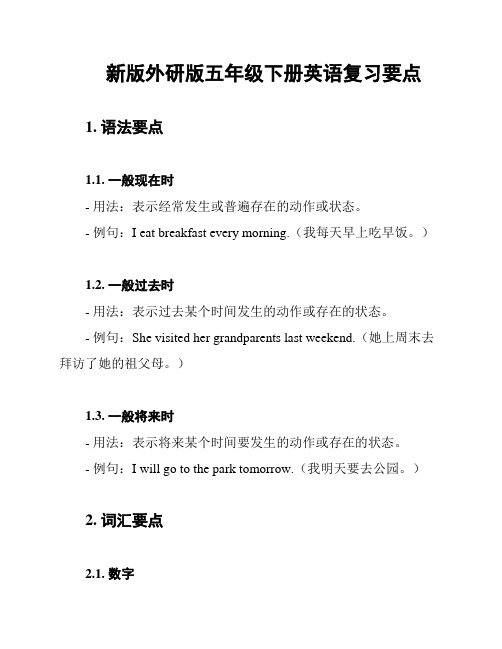
新版外研版五年级下册英语复习要点1. 语法要点1.1. 一般现在时- 用法:表示经常发生或普遍存在的动作或状态。
- 例句:I eat breakfast every morning.(我每天早上吃早饭。
)1.2. 一般过去时- 用法:表示过去某个时间发生的动作或存在的状态。
- 例句:She visited her grandparents last weekend.(她上周末去拜访了她的祖父母。
)1.3. 一般将来时- 用法:表示将来某个时间要发生的动作或存在的状态。
- 例句:I will go to the park tomorrow.(我明天要去公园。
)2. 词汇要点2.1. 数字- 读法:one, two, three, four, five, six, seven, eight, nine, ten, eleven, twelve, thirteen, fourteen, fifteen, sixteen, seventeen, eighteen, nineteen, twenty, thirty, forty, fifty, sixty, seventy, eighty, ninety, one hundred.- 用法:可以用于数数、表示年龄、时间等。
2.2. 家庭成员- 词汇:father, mother, brother, sister, grandfather, grandmother.- 用法:用于描述家庭成员关系。
3. 句型要点3.1. 简单陈述句- 结构:主语 + 谓语 + 宾语。
- 例句:She likes apples.(她喜欢苹果。
)3.2. 疑问句- 结构:疑问词 + 助动词 + 主语 + 谓语 + 其他?- 例句:Where do you live?(你住在哪里?)3.3. 祈使句- 结构:动词原形 + 其他。
- 例句:Open the door.(打开门。
)以上是新版外研版五年级下册英语复习的要点。
五年级英语下册期末复习重点
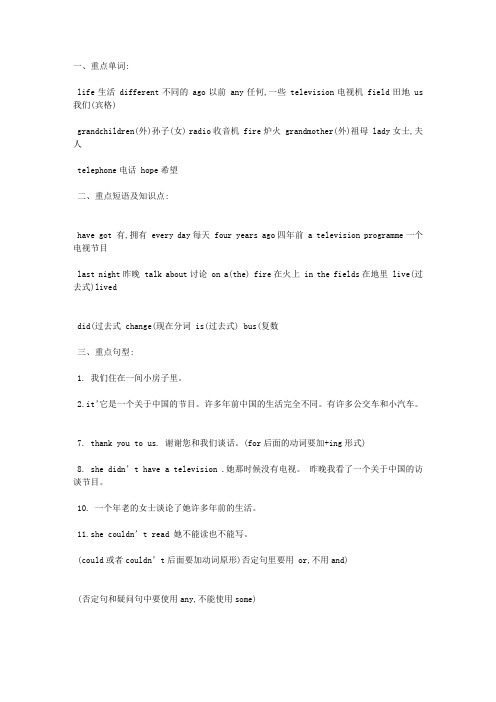
一、重点单词:life生活 different不同的 ago以前 any任何,一些 television电视机 field田地 us 我们(宾格)grandchildren(外)孙子(女) radio收音机 fire炉火 grandmother(外)祖母 lady女士,夫人telephone电话 hope希望二、重点短语及知识点:have got 有,拥有 every day每天 four years ago四年前 a television programme一个电视节目last night昨晚 talk about讨论 on a(the) fire在火上 in the fields在地里 live(过去式)liveddid(过去式 change(现在分词 is(过去式) bus(复数三、重点句型:1. 我们住在一间小房子里。
2.it’它是一个关于中国的节目。
许多年前中国的生活完全不同。
有许多公交车和小汽车。
7. thank you to us. 谢谢您和我们谈话。
(for后面的动词要加+ing形式)8. she didn’t have a television .她那时候没有电视。
昨晚我看了一个关于中国的访谈节目。
10. 一个年老的女士谈论了她许多年前的生活。
11.she couldn’t read 她不能读也不能写。
(could或者couldn’t后面要加动词原形)否定句里要用 or,不用and)(否定句和疑问句中要使用any,不能使用some)qiu jiagou.我在邱家沟。
(情景连线)第二模块一、重点单词:learnt(learn的过去式)学习 these这些 dancer舞蹈演员 class班级 study学习 hard 努力的retired退休的二、重点短语及知识点:dance( learn(过去式 learn(现在分词 make(过去式 teach(过去式) study(过去式 -go(三单 dance(名词)三、重点句型:因为她是个舞蹈演员。
部编英语五年级下册课文重要语法点汇总
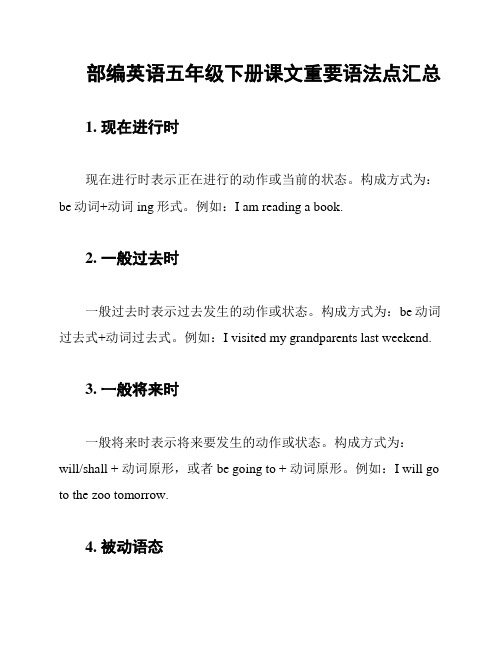
部编英语五年级下册课文重要语法点汇总1. 现在进行时现在进行时表示正在进行的动作或当前的状态。
构成方式为:be动词+动词ing形式。
例如:I am reading a book.2. 一般过去时一般过去时表示过去发生的动作或状态。
构成方式为:be动词过去式+动词过去式。
例如:I visited my grandparents last weekend.3. 一般将来时一般将来时表示将来要发生的动作或状态。
构成方式为:will/shall + 动词原形,或者be going to + 动词原形。
例如:I will go to the zoo tomorrow.4. 被动语态被动语态表示动作的承受者。
构成方式为:be动词+过去分词。
例如:A book was given to me.5. 形容词比较级和最高级形容词比较级表示两者之间的比较,构成方式为:在形容词后面加-er。
例如:This book is heavier than that one.形容词最高级表示三者以上的比较,构成方式为:在形容词后面加-est。
例如:This is the heaviest book.6. 名词所有格名词所有格表示某物的归属。
构成方式为:在名词后面加-'s,或者在名词后面加一个空格再加'。
例如:This is Tom's book.7. 疑问词疑问词用于提问,包括:what(什么)、who(谁)、where (哪里)、when(什么时候)、why(为什么)、how(怎样)。
例如:What is your name?8. 特殊疑问句特殊疑问句是以疑问词开头的句子,用于询问特定信息。
例如:Where is the library?9. 祈使句祈使句是用来给出命令、建议或请求的句子。
例如:Please write your name on the paper.10. 宾语从句宾语从句是句子中的一个从句,作为动词或介词的宾语。
- 1、下载文档前请自行甄别文档内容的完整性,平台不提供额外的编辑、内容补充、找答案等附加服务。
- 2、"仅部分预览"的文档,不可在线预览部分如存在完整性等问题,可反馈申请退款(可完整预览的文档不适用该条件!)。
- 3、如文档侵犯您的权益,请联系客服反馈,我们会尽快为您处理(人工客服工作时间:9:00-18:30)。
五年级英语下册重点句型复习
一般现在时涉及的语法考点:
一.When引导的特殊疑问句
1.就时间进行提问和回答:
--- When do you + 行为活动?
--- I + 行为活动+ 具体时间。
例:①.A: When do you eat dinner ? 你什么时候吃晚餐?
B:I eat dinner at 7:00 in the evening. 我在晚上七点种吃晚餐
②. A:When is the best time to go to Beijing? 最好在什么时候去北京?
B:Fall. 秋天。
2.就什么时候过生日或特殊节日进行问答:
--- When is + 某人的(你的,我的,他、她的)+ birthday?
--- It's in +月份
例:①A:When is your birthday? 你的生日在什么时候?
B:My birthday is in May. 我的生日在五月份。
②A:When is Teacher’s Day ? 什么时候是教师节?
B:It's on September 10th . 九月十日
二.What引导的特殊疑问句:
1.就活动内容进行问答;
--- What do you do + 时间?(教材主要是周末)
--- I + sometimes / often / usually + 行为活动+ 时间。
例:①A:What do you do on Mondays?你在星期一都干什么?
B:I usually do the homework. 我通常做作业。
②A: What do you do on the weekend?
B: I often play football.
A:How about you?=What about you? 你呢?(可以用于反问what提出的问题)
2.就职业的问与答
----What do you do?
----I am a ....(职业)
例:① A:What do you do? 你是做什么的?
B:I am a policeman.我是—个警察。
女警察:policewoman
3.就某地的季节和天气的问与答
---What is your favourite +季节,爱好,食物,科目等感兴趣的东西
----My favourite +季节等+is.. 或I like +季节
例:①A:What is your favourite season?
你最喜爱的季节是什么季节?
B:My favourite seson is spring. 我最喜爱的季节是春季。
-----What season is it +月份+地点
-----It's ....(季节)
例:②A:What season is it in March in Beijing? 在北京的三月份是什么季节?
B:It’s spring.是春天。
-----What’s the weather like +地点
------It's...(天气的形容词)
例:③A:What’s the weather like in fall in Beijing? 秋天的北京是什么天气?
B:It’s sunny and cool. 是晴朗和凉爽的。
4.就日期的问与答
----What's the date?
--- It's + 几月几号(具体日期)。
例:①A:What’s the date? 几月几号啊?
B:It’s May 10th. 五月十号
②A:What is the date today? 今天是几月几号?
B:It’s June 3rd. 今天是六月3号。
5.what和情态动词can的搭配使用。
A:What can you do at homework? 你在家能做什么?
B:I can sweep the floor. 我可以扫地。
三.Which 引导的特殊疑问句,谈论最喜欢的季节或食物等:
--- Which season do you like best? / What's your favourite season?
--- I like + 季节+ best.
例:①A:Which season do you like best ? 你最喜欢是什么季节?
B: I like spring best.(Spring.) 我最喜欢春季。
四.Why 引导的特殊疑问句,谈论喜欢某个季节或某种东西的原因:
--- Why do you like + 季节?
--- Because I can + 行为活动。
----Because it’s +季节或该种东西的特点
例:A:Why do you like summer? 你为什么喜欢夏天?
B:Because I can swim.或(Because it’s warm ,windy and sunny.)
因为我可以游泳(因为天气阳光灿烂)
五.Whose引导的特殊疑问句,就所有物的问与答。
-----Whose +事物+is(are)+it,this,that(they,these,those)?
-----It's +人
例:①A:Whose pen is it ? 它是谁的笔?
B:It's mine. 是我的。
现在进行时涉及的语法点
注:正在进行时be doing (标志词语:now / look! / Listen!) 一.What引导的现在进行时的特殊疑问句,提问对方、某人正在干什么:--- What is + 某人+ doing?
--- He / She / 某人+ is + 行为活动ing
例:①A:What are you doing?
B:I'm +reading a book.
②A:What are the tigers doing ? 老虎正在做什么?
B:They are eatng. 它们在吃东西
二.Be 动词引导的现在进行时的一般疑问句:
1.Is引导的一般疑问句,谈论他人(单数)是否正在进行某活动。
--- Is he / she +动作(doing)?
--- Yes, he / she is. No, he / she isn't.
例:①A: Is he playing fooball? 他在踢足球吗?
B: Yes, he is. 是的,他是。
②A:Is Amy counting numbers ? Amy正在数数吗?
B:No, she isn’t .她不是。
2.Are引导的现在进行时的一般疑问句,谈论人们(复数)正在进行的活动:
--- Are you (they) + 动作(doing?)
--- Yes, we (they) are. / No, we (they) aren't.
例:①A: Are you eating lunch? 你们正在吃午餐吗?
B: No, we aren't. 不,我们不是。
②A:Are Ling Ming and Xiao Fang doing their homework? 李明和小芳正在做作业
吗?
B:Yes,we are. 是的,我们是。
三.电话用语
介绍自己:This is / It's + 自己的名字.
要找某人:Can I speak to + 要找的人.
请稍等:Please hold on.
例:A:Hello, this is ZhangPeng. 你好,这是张鹏。
B:Can I speak to ChenJie ,Please? 我可以跟陈洁通话吗?
A:Sure. Please hold on. She’s listening to music. 可以。
请别挂机。
她正在听音乐。
